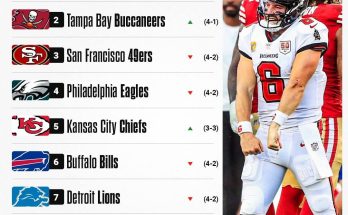He didn’t mince words. In the aftermath of yet another disappointing loss, Josh Allen stood before reporters and made it perfectly clear: he’s not going to sugarcoat things. The Buffalo Bills quarterback, normally measured but never without fire, delivered what some described as a “blunt postgame message” after his team’s showing versus the Falcons.
The context: Buffalo fell short in back‑to‑back weeks, and against Atlanta the offense sputtered in a game where the defense had handed chances back to the offense but those chances went unclaimed. Allen recognized that. He didn’t try to deflect blame or point to conspiracies or excuses. Instead, he said he needs to be better — that’s not a revelation, but coming from him it carries weight. “It takes everyone, little details matter. It wasn’t good enough tonight, we gotta find ways,” he said.
That level of accountability is part of what sets Allen apart. He’s never been one to dodge responsibility, even on nights when the game plan, the supporting cast, or circumstances contributed. But on this night his tone was sharper, more urgent, less forgiving. When the question came up about the absence of tight end Dalton Kincaid, Allen didn’t dance around it. “Not great, being down Dalton and Curtis,” he said, but then followed quickly with, “Guys gotta step up … again, I gotta be better for this team.”
Some might view that as harsh. But for Allen, it’s consistent with how he sees his role. If he’s the leader, if his name carries an implicit promise, then he must own more of the misses as well as the successes. He was explicit: opportunities arose in the game, “God‑given opportunities,” and the team failed to take advantage. (
When pressed later on whether this loss might sting more because of the timing (coming into a bye week, not immediately a chance for redemption), Allen admitted, “It’s going to eat at me the next two weeks. That suggests he won’t shake it off quickly. He knows that performance and perception matter — that the window for error is thinner than ever when a team is expected to contend.
There’s also the emotional undercurrent: Allen’s frustration is real. The frequency of these types of comments from him in recent weeks isn’t accidental. In Week 5, after a loss to the Patriots, he already delivered a blunt postgame message, lamenting sloppy play, turnovers, and failure to capitalize on red zone chances. “That’s just bad, bad football,” he said. He’s said it before; this is not new. What’s noticeable is that he’s doing it more forcefully, in more public settings, with less buffer.
Part of what makes his postgame remarks compelling is how they contrast with the usual polished, media‑safe NFL quarterback responses. Most players will deflect, point to “process,” guarantee correction, speak of unity or “next week.” Allen, when pushed, is more likely to say: “No, that was unacceptable. I have to be better. We have to do better.” That rawness resonatesth — especially for a fan base and team that has tasted high expectations.
Still, he is no dictator. Allen did not burden himself with all the blame. He acknowledged that the defense gave him chances, and he recognized that the offensive struggles in the game were collective. The distinction is that he accepts his share without minimizing theirs. That shared accountability is part of his leadership style.
One risk, though, is fatigue. So often when leaders issue blunt public rebukes, over time they can lose impact — the words become expected, the fire a little less sharp. If he continues to use this tone week after week, players and staff might begin to hear it more as rhetoric than urgency. There’s a balance to walk between holding standards and beating the locker room down.
Yet Allen seems aware of that. His postgame comment about detail, about seizing opportunities — those are not empty motivational clichés. They point to tangible areas the team must improve: execution, situational awareness, discipline. His message is not “just try harder”; it is “be smarter, cleaner, more precise.” That specificity can preserve the edge of his bluntness.
And in the larger arc, this moment reinforces Allen’s evolving identity. He’s no longer just the physical marvel with a rocket arm and running ability; he’s increasingly a full leader, someone who cares about the small margins, the hidden yard, the missed chance. This kind of commentary, especially when the overall season still carries promise, underscores that he sees the stakes clearly.
It also sends a message outward: to opponents, to media, to fans. The margin for error is shrinking. Allen is, in effect, reminding everyone that confidence — in self, in this team — is not a shield against critique. Complacency is punished. And part of leadership is making sure the standard is visible to all.
Some may bristle, especially players who feel he’s overly hard on them. But most embrace it. When your quarterback is willing to accept responsibility and demand more, it raises the bar. It makes excuses harder to hide behind. And it gives the locker room a mirror, not a mask.
In many ways, this makes him more dangerous. When Allen is publicly sharp, it means something internal is being challenged. It means he’s not satisfied. That kind of restlessness, when harnessed, tends to be productive. It suggests this season’s goals are not hollow.
Of course, success is the only refutation. If Buffalo turns it around, if they begin to win mitigated by cleaner execution, those messages will be seen as part of a turning point. If they don’t, critics will point to these moments as early warnings: the team is reacting, not executing.
But in the here and now, Allen’s bluntness is exactly what this team needed. After a game like that — where defense gives you life and the offense fails to cash in — there is no room for sugarcoating. If the leader doesn’t press, who will? His calling for more, delivered without fluff, is a challenge to himself, to his teammates, to the entire organization.
By the time the bye week arrives, that message will linger. He said it will eat at him. Good. Let it. Let it drive them. Because in a season where margins matter, and where expectations are high, you want your leader to feel the pain of defeat, not shrug it off. You want him to lean forward, not hide behind PR lines.
So yeah, that blunt postgame message wasn’t just words. It was a line in the sand. Either they respond — clean up the errors, take the open plays, make the tough throws — or they let those words become an echo. If Buffalo wants to be judged as contenders rather than pretenders, then those kinds of public reckonings matter. Allen’s voice will not be muted. He left nothing to the imagination — and for better or worse, everyone in that locker room knows exactly what he meant.


